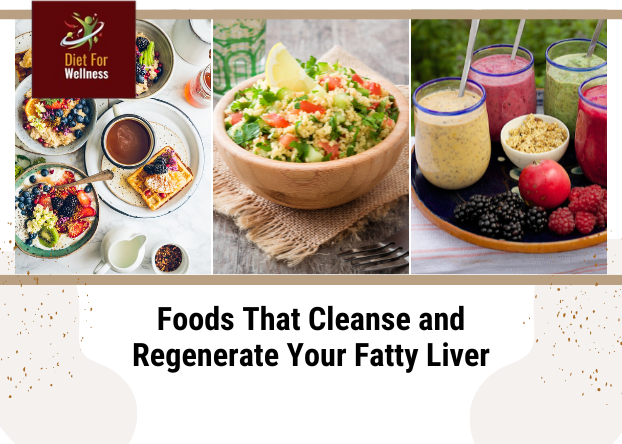Foods That Cleanse and Regenerate Your Fatty Liver

The liver is your body’s main filter, transforming toxins into waste, purifying your blood, and processing nutrients and medications to create essential proteins. Because it’s so vital to your body’s regulation, keeping your liver healthy and avoiding overindulgence is extremely important.
What Leads to Fatty Liver Accumulation?
Fatty liver disease often develops due to the following factors.

- Excess Body Weight– Being overweight or obese, particularly carrying extra weight around the abdomen, significantly increases the risk.
- Insulin Resistance and Type 2 Diabetes– These conditions disrupt the body’s ability to process sugar, contributing to fat buildup in the liver.
- Increased Blood Lipids– Increased levels of cholesterol and triglycerides in the blood are closely linked to fatty liver.
- Excessive Alcohol Consumption– Heavy alcohol intake is a well-known cause of liver damage, including fatty liver.
The Role of Diet in Fatty Liver Disease
While various factors contribute to fatty liver disease (as outlined above), dietary and lifestyle modifications can play an important role in its management. It’s always best to consult with a healthcare professional, such as your doctor, clinic, or a registered nutritionist, to determine the most appropriate dietary and lifestyle changes for your individual situation.
Foods to Support Liver Health
Adopting a balanced diet and maintaining a healthy weight are essential for preventing liver damage. Incorporating a variety of liver-friendly foods can promote overall liver function.

- Dairy Products– Include milk, yogurt, and cheese.
- Lean Proteins- Opt for fresh meat and fish, eggs, tofu, nuts, and seeds.
- Fruits– Choose fresh fruits.
- Vegetables, Beans, and Legumes– Prioritize fresh varieties.
- Whole Grains– Incorporate whole-grain breads, cereals, rice, and pasta into your diet.
Additionally, it’s important to limit alcohol consumption to align with national health recommendations for adults.
For more detailed information on healthy choices for managing fatty liver disease, you can refer to a trusted nutritionist.
Foods to Limit for Best Liver Function
Certain foods can put a strain on your liver and should be consumed in moderation or avoided. These are

- Processed Foods– Packaged snacks, biscuits, fast food, and ready meals are often high in unhealthy fats, added sugars, and artificial additives that can negatively impact liver health.
- Sugary Beverages– Soft drinks and energy drinks, due to their high added sugar content, can contribute to fat accumulation in the liver and promote insulin resistance.
- Excess Alcohol– Beyond moderate intake, excessive alcohol is a significant cause of liver damage, potentially leading to conditions like fatty liver, hepatitis, or cirrhosis over time.
- Refined Carbohydrates– Foods like white bread, white rice, and white pasta are linked to increased liver fat. Reducing intake of these refined carbs can support your liver’s well-being.
Maintaining a Healthy Weight and Body Mass Index
If you’re managing a liver condition, maintaining a healthy body weight through a balanced diet and regular exercise is important. Being overweight significantly increases your risk of developing fatty liver disease.
Fatty liver disease occurs when excessive fat accumulates in your liver. While it often presents without noticeable symptoms, it can lead to serious long-term health complications, including cirrhosis and, in some cases, liver cancer.
Track Your Weight Regularly
A simple way to monitor your weight is to keep a scale and a calendar handy. Weigh yourself once or twice a month and record the weight on the calendar. If you notice an increase in your weight, it’s advisable to consult your doctor. They can explain Body Mass Index (BMI) and provide personalized guidance on diet and exercise to support your liver health.
Lifestyle Changes for a Healthy Liver
Interested in learning more about lifestyle adjustments that can promote a healthy liver? Contact Diet For Wellness at 9904419330 for further guidance.
